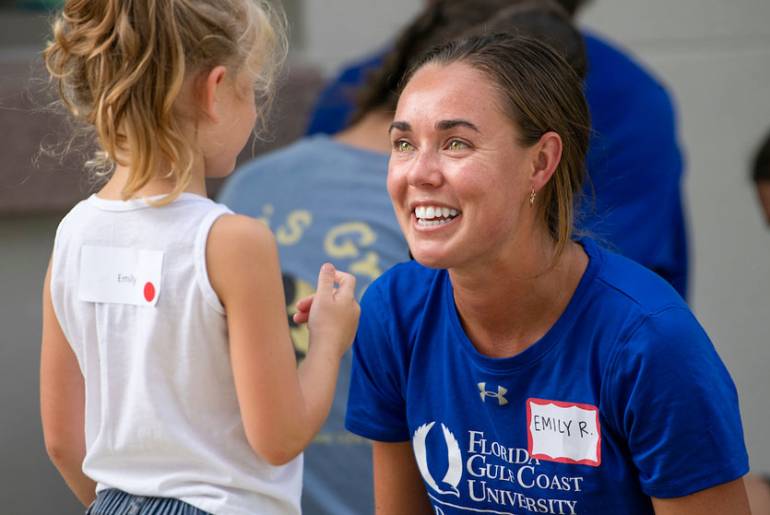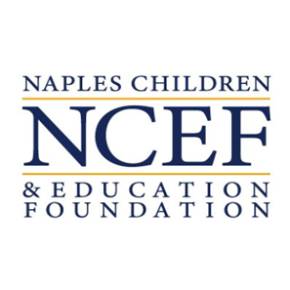Nurturing Lifelong Learners in Collier County

The Little Eagles Learning Center and NCEF Early Childhood Development Learning Center, operated by Florida Gulf Coast University’s College of Education, are exemplary learning hubs dedicated to providing high-quality, affordable early care and education for infants, toddlers, and preschoolers.
The mission of the centers is to provide high quality early care and educational experiences for young children. To realize this mission the centers provide families of FGCU and the surrounding communities’ access to affordable early childhood care and education for their infants, toddlers, and preschool children. These centers excel in creating a safe, nurturing, and intellectually stimulating environment where children's developmental needs are met through engaging, diverse activities.
Their curriculum, grounded in NAEYC standards and Florida’s Early Learning and Developmental Standards, designed to foster excellence in physical, cognitive, language, and social-emotional development.
As leading models for Lee, Collier, Charlotte, Hendry, and Glades counties, the centers also function as premier learning laboratories for FGCU students and faculty. They offer exceptional hands-on training for practicum students and volunteers, and support cutting-edge research in early childhood education. The centers boast a Professional Resource Library, funded by the Five “STAR” Project, which collaborates with local schools and childcare providers to advance best practices and resources in early childhood education.

We are delighted to extend a warm welcome to our Collier County parents and community partners. At NCEF Early Childhood Development Center (ECDC), we recognize the profound privilege of being part of a child's early years. As partners in your child’s growth and development, our teachers work closely with you to achieve meaningful milestones together. Your involvement and support are integral to creating a rich and fulfilling experience for your child here at NCEF Early Childhood Development Center. ”
Safety and Security
At NCEF Early Childhood Development Center, your child's safety is our top priority. To ensure a secure environment, we employ a two-step entry system: a buzzer at the front door and a keycard access at the second door. Our comprehensive security measures include video surveillance throughout the building and its perimeter, safeguarding the children, families, and staff.
Classroom Sizes and Availability
At NCEF Early Childhood Development Center, we are dedicated to providing a nurturing environment where every child can flourish emotionally, socially, and academically. Our inclusive setting ensures that each child receives the attention and support they need to thrive.
We maintain small classroom sizes and favorable child-to-teacher ratios to foster a personalized and engaging learning experience.
- Infants: 1:4, group size 8
- Toddlers: 1:6, group size 12
- Two’s: 1:6, group size 12
- Preschool: 1:10, group size 18
- Pre-Kindergarten: 1:10, group size 17
Research-based Curriculum
At NCEF ECDC, we value high-quality, comprehensive resources that empower educators to intentionally teach and care for our youngest learners during the most critical and formative years of development. Additionally, the center uses an authentic, ongoing observation-based assessment system that helps teachers and administrators focus on what matters most for children's success.
Information for Parents
Pre-Enrollment Application
Parents seeking enrollment for their child(ren) must complete a pre-enrollment application. Parents of children between the ages of 6 weeks and 5 years old are welcome to pre-enroll.
Once an application is received, applicants will receive an invitation to download the Procare App and an invoice in the amount of $15.00, which is a non-refundable wait list application fee.
Enroll NowThe fee structure for the Early Childhood Development Centers is determined based on an analysis of comparable community early childhood center rates in the area. Rates are subject to change and approved by Florida Gulf Coast University governing body.
Subsidized childcare is determined and provided through the Southwest Florida Early Learning Coalition School Readiness Grant. For more information go to www.elcofswfl.org
|
Full-Time Student |
Employee |
Community |
|
|
Infants |
$192 |
$225 |
$250 |
|
Toddlers |
$182 |
$205 |
$230 |
|
Preschool |
$172 |
$190 |
$210 |
|
VPK Wrap-around |
$172 |
$190 |
$210 |
Purpose of the PTO
Developing strong collaborative, supportive partnerships between Early Childhood Development Center staff and families is essential to providing high quality learning experiences for young children. When staff and families work together children learn and grow successfully. Each Early Childhood Development Center will establish and maintain a PTO representative of parents and Center classroom and support staff.
Responsibilities of the Center PTO
- To support the successful operation of the Early Childhood Development Center.
- To champion Center fund raising and individual donor support efforts intended to enhance the learning experiences for all children and families attending the center.
- To assist with community outreach efforts in communicating the vision and mission of the FGCU Early Childhood Development Center.
- To annually elect representatives from the Center to serve on the Early Childhood Development Center Advisory Council.
Organizational Structure of the PTO
Each Center will establish a PTO with annual membership to include:
- A parent / family representative from each classroom or age group approved by families in the represented classroom or age group.
- Staff representatives one (1) for each 25 children recommended by Center staff and approved by the Center Director.
- The Center Director
PTO Meeting Operations
Each PTO will establish a yearly meeting structure to support the ongoing collaboration of families and Center staff. PTOs are required to meet two (2) times each year for the purpose of sharing Center goals and reviewing progress and outcomes. It is recommended that PTOs consider meeting quarterly through the year to plan and execute Center PTO activities.
Once established the PTO membership will select Co-Chairs one (1) parent and one (1) staff member approved annually to facilitate meetings. The Center Director will work collaboratively with the Co-Chairs to plan agendas, develop and implement PTO activities. A meeting agenda will be developed prior to the meeting and meeting minutes will be recorded and shared with all enrolled families and staff members. A financial accounting of PTO funds raised and expenses is required to be managed by the Center Director and communicated to families annually.
The Purpose and Structure of the Advisory Council
The FGCU Regulation requires establishing an Advisory Council with the purpose to serve in an advisory capacity to the operations of the center. Recommendations from the Advisory Council are communicated with the College of Education Advisory Council.
Educational Research Centers for Child Development:
University child day care centers are established to provide quality care for children of students, both graduate and undergraduate, faculty, other staff and employees of the University along with community members. These Centers for Child Development also provide an opportunity for interested schools or departments of the University to conduct educational research programs and establish internship programs for such centers. The purpose of those Centers for Child Development is to provide research and training activities, which are representative of a comprehensive scope of child development needs throughout the community.
Organizational Structure of Educational Research Centers for Child Development:
FGCU operates two Early Childhood Development Centers under the direction of the FGCU Board of Trustees. The College of Education oversees the operations of both centers. The Little Eagles Early Childhood Development Center (LELC) is located on the FGCU campus. The NCEF Early Childhood Development Center is located in Collier County on the campus of Florida Southwestern State College. FGCU operates this center with the Naples Children and Education Foundation (NCEF). The College of Education manages both centers under the direction of a Director of Early Childhood Development Programs. Each center has a full-time Center Director credentialed by the Florida Department of Children and Families (DCF).
Advisory Council Membership:
Membership as outlined in the regulation shall consist of: President of the University or designee, Dean of the College of Education or designee; Dean of Students or designee; one (1) parent for each fifty (50) enrolled children at each center, elected annually by parents of children enrolled at each Center; one (1) campus-wide or community person; and the Chair or designee, of each department participating in the Center. Advisory Council members are required to attend FGCU Advisory Council training. The Advisory Council is required to meet annually and may meet more often if requested. The Advisory Council is required to have a meeting agenda and maintain meeting minutes.
At NCEF ECDC, we value high-quality, comprehensive resources that empower educators to intentionally teach and care for our youngest learners during the most critical and formative years of development. Additionally, the center uses an authentic, ongoing observation-based assessment system that helps teachers and administrators focus on what matters most for children's success.
The Creative Curriculum®
The Creative Curriculum is research-based and supports the development of the whole child. High-quality, comprehensive resources empower educators to intentionally teach and care for our youngest learners during the most critical and formative years of development.
The Creative Curriculum® is…
- Innovative: delivering cutting-edge resources that are unique, effective, and based on the latest research.
- Responsive:including solutions that address educators' challenges and help create a responsive learning environment.
- Supportive: providing robust guidance to support each educator's professional journey.
- Comprehensive: aligning to all state early learning guidelines and the Head Start Early Learning Outcomes Framework
- Developmentally Appropriate: promoting learning experiences designed for each age-group and flexibly tailored to each child's needs with high-quality, research-based resources.
Teaching Strategies GOLD
The authentic, ongoing, observation-based assessment system that helps teachers and administrators focus on what matters most for children's success.
Grounded in our 38 research-based objectives for development and learning, GOLD® supports effective teaching and assessment, while providing teachers with more time to spend with the children in the program. Accessed through MyTeachingStrategies™, GOLD® automatically links teaching and assessment, making it easier to connect the dots across the most important aspects of high-quality early childhood education.
With GOLD®, teachers can:
- Use a variety of online tools to gather and organize meaningful data quickly, including online portfolios where children's work can be stored.
- Create a developmental profile of each child to answer the questions, "What does this child know? What is he or she able to do?" that can be used to scaffold each child's learning.
- Generate comprehensive reports that can be customized easily and shared with family members and other stakeholders.
Supplemental Curriculum: Conscious Discipline
Conscious Discipline is a comprehensive emotional intelligence and classroom management system that integrates all domains of learning (social, emotional, physical, cultural and cognitive) into one seamless curriculum. Conscious Discipline is an evidence-based comprehensive program that utilizes everyday events rather than an external curriculum and addresses the adult's emotional intelligence as well as the child's. Teachers learn to respond to daily conflict in a way that transforms it into an opportunity to teach critical life skills and watch every aspect of their classroom life improve! Conscious Discipline is evidence-based and was named as a national model for character education by the Florida State Legislature.

